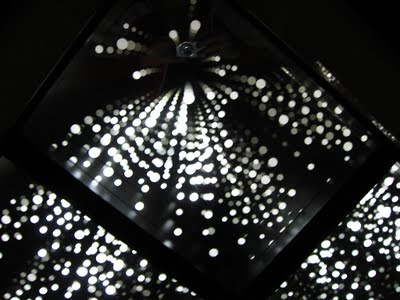万変不驚 Banpen Fugyo: Emptiness in the Midst of Constant Change
From Bujinkan Santa Monica by Bujinkan Santa Monica
 |
| Infinite Dots - elevator ceiling, Fujisawa. photo by randomidea |
"To be able to survive and live in the midst of this constant change, it is important to comprehend that which is the essence. To this end, I believe it is important to vary this theme of change every year."Maybe you have a teacher who reminds you of 万変不驚 Banpen Fugyo all the time. You get the idea of "Ten thousand changes, No surprises", but how to put it into practice?
There is a poem from the 22nd Buddhist Master 摩拏羅:Manorhita,
心隨萬境轉 the mind follows the ten thousand circumstances and shifts accordingly;
轉處實能幽 It is the shifting that is truly undefined.
隨流認得性 Follow the current and recognize your nature;
無喜復無憂 No rejoicing, no sorrow.
How do you recognize your nature and what is it exactly? Manorhita asked one of his teachers this:
“What is the original nature of mind?” Vasubandhu answered, “It is the emptiness of the six sense bases, the six objects and the six kinds of consciousness.” And hearing this, Manorhita was awakened.The six sense bases are seeing, hearing, tasting, touching, and so on. The six objects are forms, sense, sounds, and so on. The six consciousnesses are the acts of hearing, seeing, tasting, touching, and so on.
What does it mean for these to be empty? This word emptiness in sanskrit is Śūnyatā. It can also be translated as void, or relative or contingent. Roshi Gerry Wick describes it this way:
"Śūnyatā is really a wonderful, tender, limitless embrace. It’s always complete. It is without having to strive, without having to not strive. Another implication of emptiness is empty of any fixed position or state of being."While this is an important lesson for life, the ten thousand changes in combat are the actions and strategies of your opponent. If you pay attention to every punch, kick or technique, your mind gets taken and trapped in following each thing. The same trapped mind occurs when you focus on performing your own technique or style. You will be surprised when something unexpected happens. This will lead to your defeat.
If instead you allow the mind to dwell in emptiness, for example - looking at the opponent's eyes but not focusing on them (some suggest looking at the spot where the lapels of the gi cross) - you will react naturally as the situation dictates. Anything your opponent manifests will just appear to be part of the natural flow and not surprising.
By paying attention to the non existent, you will be able to see the existent quite well.

